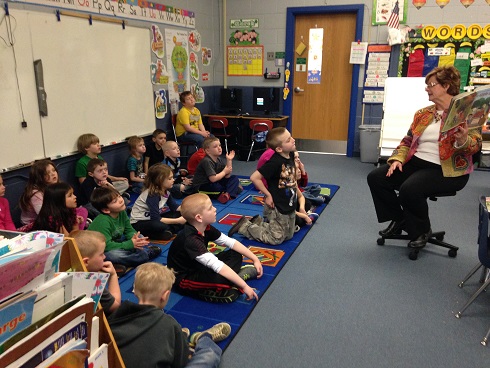Kentucky Ag Literacy Week in Lincoln County
 March 15-21, 2015, was Kentucky Ag Literacy week. To celebrate, members of the Lincoln County Farm Bureau Women’s Committee went to each of the elementary schools and read to a class from Kindergarten to 2nd grade. The book they read was called "The Apple Orchard Riddle" by Margaret McNamara and illustrated by G. Brian Karnes. Each committee member did an activity with the class. At Waynesburg Elementary, students were given slices of red, yellow, and green apples to taste. They were then asked to stand at a spot in the room that showed which apple they liked best. They talked about how people are different, just like apples are different. An apple was cut to show them the star in the middle. They were reminded of the riddle to share with their parents. The book and educator’s guide was donated to the school.
March 15-21, 2015, was Kentucky Ag Literacy week. To celebrate, members of the Lincoln County Farm Bureau Women’s Committee went to each of the elementary schools and read to a class from Kindergarten to 2nd grade. The book they read was called "The Apple Orchard Riddle" by Margaret McNamara and illustrated by G. Brian Karnes. Each committee member did an activity with the class. At Waynesburg Elementary, students were given slices of red, yellow, and green apples to taste. They were then asked to stand at a spot in the room that showed which apple they liked best. They talked about how people are different, just like apples are different. An apple was cut to show them the star in the middle. They were reminded of the riddle to share with their parents. The book and educator’s guide was donated to the school.
KFB Spotlight
- London's Cornett Farm Fresh Provides One-Stop-Shop with Local Flair
- July 16, 2024
-

-
The market’s successes recently earned them a 2024 Pacesetter Award by the Kentucky Small Business Development Center.
- Down the Backroads: The Bond of a Barn Family
- July 16, 2024
-

-
It doesn’t matter whether you live on a farm or not, or show livestock or not, we can experience that expanded family feeling simply by being together, caring for each other, and helping out in times of need.
- KFB President Eddie Melton: Advocating for the Ag Industry
- July 16, 2024
-

-
We must remain vigilant in our efforts to advocate for our industry especially in the toughest of growing seasons.